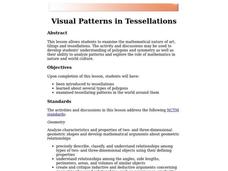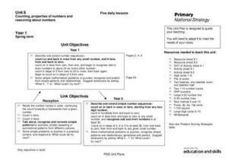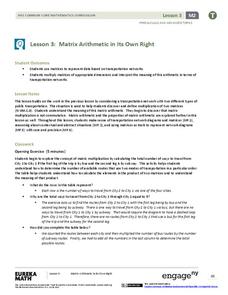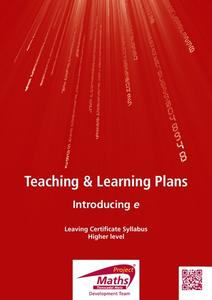Curated OER
Recognizing Patterns
Middle schoolers explore the concept of patterns. In this patterns lesson, students use applets to manipulate tessellations. Middle schoolers predict the next number in a sequence by recognizing patterns.
Curated OER
Visual Patterns in Tessellations
Students explore tessellations as well as various types of polygon. Students examine tessellating patterns in the world around them. Students examine tessellations by creating their own tessellations and completing the included worksheet.
Curated OER
Learning Even and Odd Numbers
In this math lesson, young learners receive a numeral written on a paper and arrange themselves in chronological order. They illustrate skip counting by 2's, 5's, and 10's using their numerals and then complete an individual 100 chart by...
Curated OER
Counting, Properties of Numbers, and Reasoning about Numbers
Five days of lessons develop number sense and counting patterns, including odd and even numbers, 5s and 10s, doubles, and ways to make 10. Each session opens with fun finger play to reinforce counting and reasoning about numbers. Various...
EngageNY
When Can We Reverse a Transformation? 2
The second lesson on finding inverse matrices asks class members to look for a pattern in the inverse matrix and test it to see if it works for all matrices. The teacher leads a discussion to refine the process in finding inverses,...
Pennsylvania Department of Education
What is the Chance?
Fourth and fifth graders make predictions using data. In this analyzing data instructional activity, pupils use experimental data, frequency tables, and line plots to look for patterns in the data in order to determine chance. You will...
Curated OER
What Goes Up Must Come Down!!
Fifth graders look at actual sunrise and sunset times for their hometown to determine a pattern in the amount of daylight. They collect their data in Excel and create a chart to help them identify the pattern, then write an explanation...
Curated OER
Indiana Applied Skills Assessment Sample
In this Applied Skills Assessment worksheet, 5th graders complete a sample state assessment for Language Arts and Mathematics for 5th graders. They read a writing prompt and complete a writing activity that follows, answer various types...
Willow Tree
Line Plots
You can't see patterns in a jumble of numbers ... so organize them! Learners take a set of data and use a line plot to organize the numbers. From the line plot, they find minimum, maximum, mean, and make other conclusions about the...
John Lentine
Butterflies and Bugs
Symmetry, line, shape, art, and math are all connected through a fun hands-on craft. Included are instructions to a classic activity, where learners create butterflies to show symmetry in nature and then discuss symmetry in math. It is...
Virginia Department of Education
Integers: Addition and Subtraction
Young mathematicians construct their own understanding of integers with an inquiry-based math lesson. Using colored chips to represent positive and negative numbers, children model a series of addition and subtraction problems as...
Curated OER
Linear Programming
Students explore inequalities to determine the optimal solution to maximize a profit for a company. In this linear programming instructional activity, students discover how to graph inequalities and how to determine the algebraic...
EngageNY
Matrix Arithmetic in Its Own Right
Matrix multiplication can seem random to pupils. Here's a instructional activity that uses a real-life example situation to reinforce the purpose of matrix multiplication. Learners discover how to multiply matrices and relate the process...
Virginia Department of Education
Types of Variations
Scholars determine how two quantities vary with respect to each other. They complete a fill-in-the-blank activity by stating whether the entities vary directly, inversely, or jointly, create equations that match different variations, and...
Project Maths
Introduction to e
First there was pi and now there's e. A discovery-based lesson plan helps learners find a pattern in compound interest as the compounding period changes. Their investigation results in the discovery of the number e. The lesson plan is...
02 x 02 Worksheets
Inverse Functions
Young mathematicians look for patterns in inverse functions as they relate to the original functions. The comprehensive lesson emphasizes vocabulary throughout as well as algebraic and graphical characteristics of the inverse functions.
Illustrative Mathematics
The Stamp Collection
By using language like "half of the stamps," children are exposed to patterns in arithmetic that requires solving a two-step word problem. This type of language opens a new door for transitioning learners toward understanding fractions...
Illustrative Mathematics
Eight Circles
We are used to finding the area of a circle by plugging the radius into an equation. Here, learners are required to go further to find multiple areas and calculate the difference. They must detect a pattern in order to figure out the...
Curated OER
There's Gold in Them Thar Ratios
Students draw a model of the bunny problem which generates the Fibonacci Sequence, spirals generated from golden rectangles and golden triangles; identify the golden ratio in the human body, and find the Fibonacci numbers in nature.
Curated OER
Investigation - Patterns
Learners create a pattern out of pattern blocks. For this math lesson, students work with a partner to investigate the pattern they have. Within that group, learners continue to design the pattern by adding the next two pieces....
Curated OER
Getting in Shape Again
Students create rocket shapes out of pattern blocks. They draw a picture of a rocket, build a pattern block rocket following simple directions, and complete a graph of the shapes used.
Curated OER
Patterns
Young scholars extend, generalize, recognize, and write a variety of patterns using an AppleWorks template and the Inspiration or Kidspiration educational software. This technology-based math lesson is intended for the early elementary...
Curated OER
In and Out Function Problems
Third graders solve In and Out function problems. They analyze a chart and discuss the steps to solving the functions, and discuss the patterns and complete the charts. Students then create a book of repeating patterns using magazines,...
Curated OER
How using number patterns help us add or subtract
Second graders use a number line to understand multiples. In this number line lesson, 2nd graders use a floor size number line and calculate problems with multiples. Students complete a worksheet with multiples.
Other popular searches
- Growing Patterns in Math
- Number Patterns in Math
- Geometric Patterns in Math
- Pasta Patterns in Math
- Increasing Patterns in Math
- Patterns in Math Quiz
- Repeating Patterns in Math
- Color Patterns in Math
- Identifying Patterns in Math
- Nature's Patterns in Math























